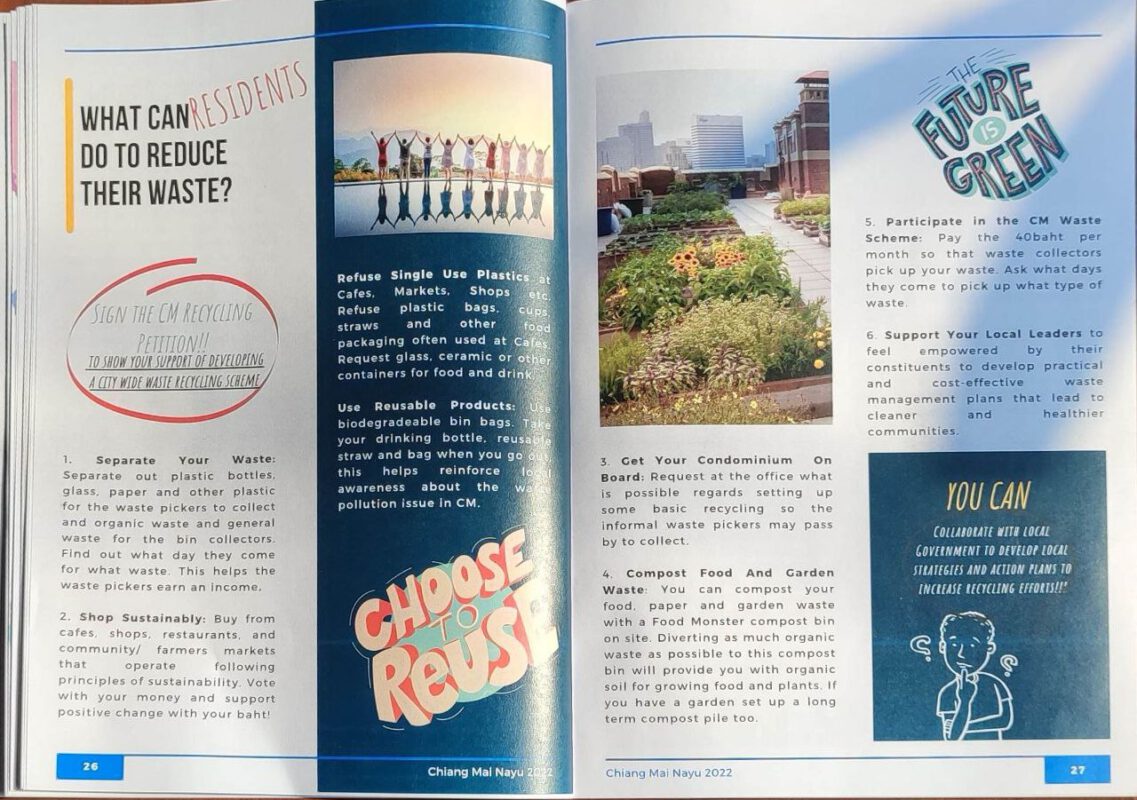Education for Sustainability
We have commenced our mission of empowering the communities of Chiang Mai to drive positive change for sustainability by guiding children, adolescents, youth, and adults towards success, happiness, and purpose through personnel development and participatory learning on sustainability practices in Chiang Mai.
We concentrate our initial efforts on engaging learning communities for which we have designed an educational sustainability programme that addresses specific local challenges in waste management practices and its interconnectedness with climate change as we experience it in Chiang Mai. Our core focus is on delivering educational support to local schools but also offer our expertise to other institutions where needed.
We are aware that the Chiang Mai communities not only depend on higher English skills in communicating with an ever-increasing stream of international visitors for tourism and business purposes but also take pride in being able to communicate in English. We offer an English medium learning course to aid overburdened local educators in their desire to deliver the relevant learning experience. In doing so, we provide an opportunity for participants to learn new vocabulary that is highly important in understanding today’s discussions and engage with global citizens and learn in duality about sustainability and English language. Thai translation materials are also provided to further ensure understanding.
Involving Schools in Sustainability
We recognize that facilitating environmental education and connecting the local communities are a key mechanism for proper waste management required to reduce waste pollution and promoting a cleaner, healthier Chiang Mai.
With our Sustainability Education English Programme, we champion local schools by delivering a comprehensive learning experience that can serve as an English subject integrated practical learning modality by learning about environmental sustainability relevant for Chiang Mai. The programme explores the environmental and public health challenges of waste management, pollution, and recycling in Chiang Mai, highlighting the profound impact of individual waste disposal choices on the local and regional environment, landfill, waterways, and down to the ocean south of Thailand. This initiative underscores the personal responsibility we all carry to fosters positive behavioural change and analytical thinking, and ultimately promotes a “System Thinking” approach to our waste practices.

This approach of ours follows the vision of a call for ‘greening education’, in engagement with the local community, and supporting education programmes with learning resources. We provide lived waste recycling solutions that connect the local communities for collaborative efforts. By integrating sustainability into daily routines, we aim to foster a culture of environmental awareness from childhood to adulthood with personal responsibility and inspire positive behavioural change.
Background
In societies, there is a general lack of awareness and understanding about sustainable waste management practices, the connection with pollution of the environment, and the impact each our individual action has on climate change. Improper waste disposal plagues Chiang Mai, polluting land, water, and contributing to global marine plastic pollution. Schools lack awareness, structured programs, and resources to address this issue. Students and teachers lack knowledge of sustainable practices and responsible waste management. The insufficient city-wide recycling services and facilities exacerbate the problem of littering – in particular plastic. These factors create public health risks, environmental degradation and hinders community wellbeing.
The United Nations pointed out in its historic Transforming Education Summit in 2022 the need for Greening Education, across all domains. To summarize, it was found that worldwide 95% of surveyed primary and secondary teachers felt that teaching climate change is important but less than 30% expressed a readiness to teach it; and 70% of young people cannot explain climate change and relevant aspects, can only explain it very broadly or do not know anything about it.[1] It is a worldwide phenomenon that adequate knowledge to learn about sustainability principles is not common in education practices and curricula.
As a result, it has been called upon governments, civil society, and private entities to work towards ‘greening’ education. The fact is, without proper education and basic infrastructure that facilitates and encourages environmental awareness and protection, personal responsibility and proactive behavior will remain at a low level for responsible consumption, waste reduction and recycling, and making a personal contribution towards climate change mitigation.
The missing awareness and the lack of capacities is also true for Chiang Mai. Beginning at schools, where the basic knowledge, behaviour and attitudes are to be cultivated for becoming a responsible citizen, integrating a structured and comprehensive learning experience into daily practices, as a practical part of subjects, and as a key aspect of local curricula is indispensable in fostering a knowledgeable present and future generation of Chiang Mai residents. Schools in Chiang Mai lack the necessary resources, educational materials, and the recycling infrastructure to effectively impart sustainability on site.
The Goals of the Sustainability Education English Programme
The Sustainability Education English Programme aims to achieve a comprehensive improvement in waste management knowledge and practices across multiple levels of the school community in Chiang Mai.
We focus on achieving:
- Increased Environmental Awareness through seminars and learning materials to fosters a culture of environmental responsibility.
- Positive Behavioral Change by promoting responsible consumption, waste reduction, and separation practices for a more sustainable lifestyle.
- Enhanced Community Collaborations by facilitating communication and action between schools and local waste collectors to build a collaborative network.
- Improved Waste Management Infrastructure by providing a metal recycling container that facilitates waste separation on-site.
- Empowered Young People who become environmental stewards, fostering a culture of sustainability beyond the programme’s reach.
🌱 Be Part of Education for a Greener Future! 🌍
The Sustainability Education English Program empowers public schools in Chiang Mai to:
✨ Improve English and ecological literacy.
✨ Raise awareness about climate change.
✨ Implement practical climate action solutions.
[1] UNESCO, 2022: Greening Education Partnership. Access: https://www.unesco.org/en/sustainable-development/education/greening-future
